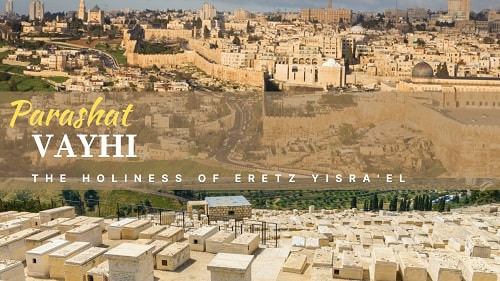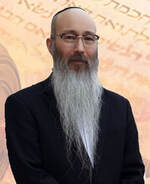|
By: HaRav Menashe Sasson מאת: הרב מנשה ששון Parashat Vayhi opens with Ya’aqob Abinu extracting a vow from his son Yosef to “carry me [Ya’aqob] out of Misrayim and bury me in” Eretz Yisra’el. Bereshit 47:29-31. Ya’aqob then sits up on his deathbed and says to Yosef, “G-d Almighty appeared to me at Luz, in the land of Kena’an, and blessed me, and said to me ‘behold . . . I will give this land to thy seed after thee for an everlasting possession.’” Bereshit 48: 2-4. After Ya’aqob passed, Yosef had him embalmed, Bereshit 50:2, and then transported his remains to Eretz Yisra’el for burial. Bereshit 50:7. Parashat Vayhi closes with Yosef ill and about to die. “Yosef said to his brothers, “I die and God will surely visit you and bring you up [to Eretz Yisra’el] out of this land [of Misrayim], to the land of which [HaShem] swore to Abraham, to Yizhaq, and to Ya’aqob.’” Bereshit 50:24. Yosef then extracted a vow from his family that they “shall carry up [to Eretz Yisra’el] my bones from here.” Bereshit 50:25. “Yosef died, being a hundred and ten years old, and they embalmed him and he was put in a coffin in Misrayim.” Bereshit 50:26. Later, in Parashat Beshallah, we learn that Moshe Rabbeinu did, in fact, take “the bones of Yosef with him,” from Misrayim to Eretz Israel. Shemot 13:19. Parashat Vayhi thus opens and closes with Ya’aqob and his son Yosef both extracting from their relatives a vow that their remains be removed from Misrayim and buried in Eretz Yisra’el. In both instances, reference was made to Eretz Yisra’el as being the land that HaShem promised to the Jewish People and in both instances the body of the deceased was embalmed before it was transported to Eretz Yisra’el. Contrary to the events which are described in Parashat Vayhi, Halakha (Jewish Law) clearly states that a deceased person should be buried within twenty-four hours of death, or at least as soon thereafter as possible, and that embalming is prohibited. The fact that Parashat Vayhi repeats that both Ya’aqob and Yosef insisted on being buried in Eretz Yisra’el suggests that the importance of being buried in Eretz Yisra’el, even if one was not able to live in Eretz Yisra’el, is so great that it constitutes an exception to the general rules of prompt burial and no embalming. The Biblical source for the concept that the body of a deceased person should be buried within twenty-four hours is derived from the passuk which states, “And if a man have committed a sin worthy of death, and he is put to death, and thou hang him on a tree, his body shall not remain all night upon the tree, but thou shalt surely bury him that day (for he that is hanged is accursed by G-d.” Debarim 21:22-23. The Talmud explains,
Maseket Sanhedrin 46b. Thus, we see from the Gemara that the Biblical source which requires burial on “that day” refers to a person who was executed for a capital offense, not to an individual who died of natural causes, or an illness, accident, or the like. We also see that Halakha permits a delay in conducting the funeral where the purpose of the delay is “that the burial will be conducted with greater dignity.” Lastly, we know that Halakha discourages embalming, as the desecration of human remains is forbidden. However, just as it is permitted to delay a funeral so that the funeral “will be conducted with greater dignity,” so too it is permitted to do that which is needed for dignity and hygiene to preserve a body for burial. Parashat Vayhi shows, through Ya’aqob and Yosef, that there no greater dignity for a deceased than to be buried in Eretz Yisra’el. Thus, the delay in burying Ya’aqob and the exhuming of Yosef’s remains, transportation, and reburial in Eretz Yisra’el was, of course, proper. A lesson we can learn from Parashat Vayhi is that while it is preferable for a Jew to live and die in Eretz Yisra’el, “the land of which [HaShem] swore to Abraham, to Yizhaq, and to Ya'aqob,” if that is not possible, the best alternative, as we learn from Ya’aqob and Yosef, is to be buried in Eretz Yisra’el. שבת שלום Shabbat Shalom! Copyright © The Israel Foundation. All Rights Reserved.
0 Comments
Your comment will be posted after it is approved.
Leave a Reply. |
THE ISRAEL FOUNDATION





